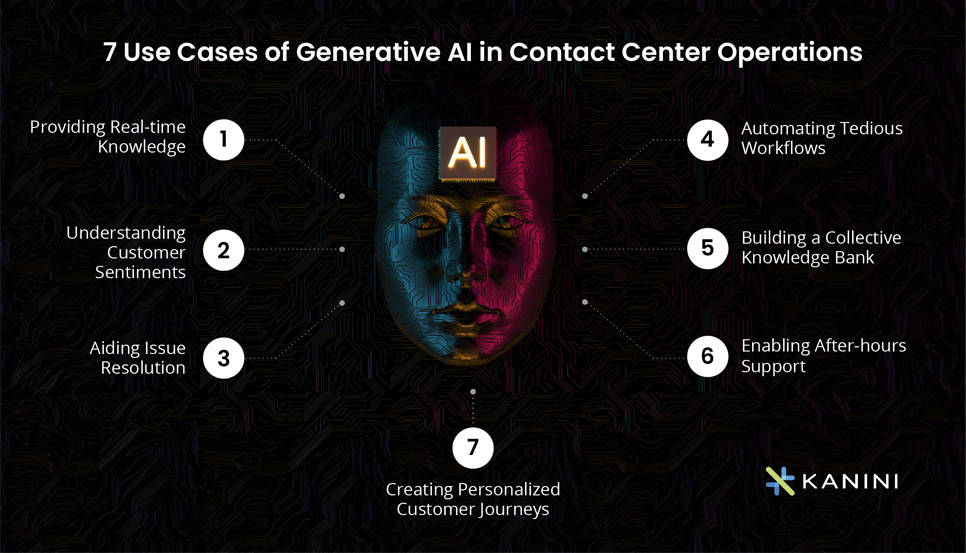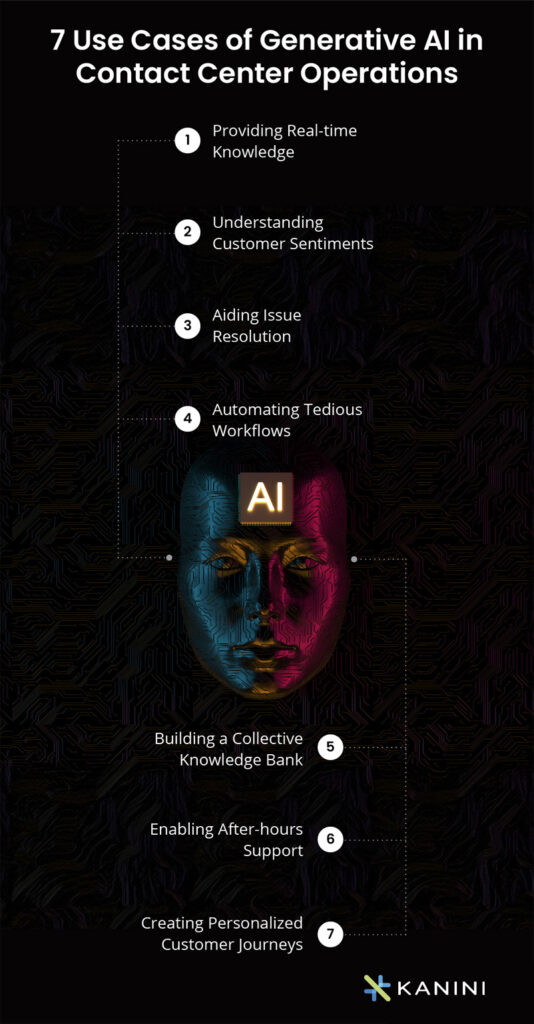Contact centers have long been the nerve center of customer interaction for businesses. Yet, for the agents working at the backend of this crucial touchpoint, the path is fraught with many challenges. Delivering the right information, deciphering customer emotions, and crafting solutions that resonate with the target customers – these are the daily hurdles that agents must overcome to deliver the best customer experience. However, handling all these challenges manually can be very difficult. According to PwC, 32% of customers stop doing business with a brand they love after only one bad experience.
This is where generative AI (Gen AI), a new wave of artificial intelligence (AI) technology emerges, empowering contact center agents to overcome the numerous hurdles they face and elevate customer experiences. In this article, we are going to explore some of the challenges in more detail and understand how Gen AI can play a pivotal role in addressing them.
What are the Difficulties Faced by Contact Center Agents?
The role of contact center agents is to make sure that the customers feel heard and to provide them with a satisfactory resolution for their issues. This road to customer satisfaction is paved with a series of complex obstacles that the agents must overcome:
- Information Overload: Customers bombard agents with a relentless stream of inquiries. Agents need quick thinking and must have all the information at their fingertips to effectively respond to customers. Sifting through knowledge bases and internal resources to unearth the precise answer can be a time-consuming and frustrating exercise. Accuracy, in this fast-paced environment, becomes a constant struggle.
- The Elusive Customer Pulse: Human emotions are nuanced and ever shifting. Discerning a customer’s underlying sentiment – frustration, confusion, or delight – is crucial for tailoring the conversation. However, most agents do their job so mechanically that they miss reading these emotions, which results in derailed interactions and customer dissatisfaction.
- Skill Gap and Lack of Subject Matter Expertise in Agents: Even with the right information, pinpointing the root cause of a customer’s issue and formulating an effective resolution can be quite a puzzle. Agents might not always understand the true problem and often find themselves shuffling through complex procedures and product intricacies, leading to extended call times, escalations, and customer dissatisfaction.
- Minimal Intelligence Collected: Every customer interaction holds a wealth of information – valuable insights into customer needs, pain points, and emerging trends. Unfortunately, this treasure trove of knowledge often remains siloed within individual calls, failing to contribute to a broader organizational understanding.
- Agent Learning Efficiency: The sheer volume of calls and limited downtime can make continuous learning a challenge for agents. They may often lack the tools or time to effectively learn from past interactions and conversations. This limitation in leveraging call intelligence can impact their ability to improve responses and provide better service in the future.
These challenges not only frustrate customers but also contribute to agent burnout, leading to high turnover rates and a decline in overall service quality.
Enter Generative AI - The Agent's Intelligent Ally
Gen AI has immense potential to revolutionize the contact center landscape. Here’s how Gen AI can become a silent partner of agents in delivering exceptional customer service:


1. Providing Real-time Knowledge:
Imagine an AI system that can intelligently scan knowledge bases and internal resources to surface the most relevant information at precisely the moment the agent needs it during live calls. Gen AI can anticipate questions, provide real-time suggestions, and ensure agents are equipped to deliver accurate and up-to-date answers with greater speed and confidence.
2. Understanding Customer Sentiments
Gen AI can assess vocal patterns, word choices, and conversational context to gauge customer sentiments using sentiment analysis techniques. By identifying frustration or dissatisfaction early on, agents can adjust their approach, de-escalate situations, and proactively address concerns. This ability to decode the “emotional subtext” leads to more empathetic and productive interactions.
3. Aiding Issue Resolution
Gen AI can analyze past customer interactions to identify common customer issues and their corresponding solutions using predictive analytics. Armed with this historical data, Gen AI can suggest resolutions to agents in real-time, accelerating the process of finding an effective answer. This not only reduces call times but also empowers agents to focus on complex cases that require a more human touch.
4. Automating Tedious Workflows
Repetitive tasks like password resets, order tracking updates, or appointment confirmations can be automated with Gen AI, reducing the manual effort going into mundane tasks. This frees up valuable time for agents when they return, allowing them to focus on more complex customer issues that require a personal touch.
5. Building a Collective Knowledge Bank
Gen AI can listen to customer calls, transcribe them accurately, and then identify key topics and recurring themes. These insights can then be aggregated and stored in a centralized knowledge base, accessible to all agents. Over time, this collective intelligence becomes a powerful resource, allowing agents to learn from past interactions and continually improve their responses.
6. Enabling After-hours Support
Gen AI can enable the off-hours experience for customers, in the absence of agents. Conversational LLMs will be able to mimic the responses of agents and contact centers can use them for simple and straightforward cases. For complex situations where the intervention of an agent is needed, Gen AI can schedule a call for the customers at the next latest time when agents would be available. This approach fosters customer satisfaction and creates a sense of continued support, even outside of regular business hours.
7. Creating Personalized Customer Journeys
Assessing customer emotions using Gen AI helps the contact center create personalized communication pathways for customers. This could involve targeted self-service options, proactive outreach for at-risk customers, or even chatbots trained on a specific customer’s past inquiries. Moreover, based on the pool of insights drawn from customer interactions, leveraging Gen AI, contact centers can respond to customers with personalized products and/or services offering that would add value to their experience.
A Common Question - Will Agents Lose Their Jobs if Gen AI is Introduced at Contact Centers?
This is a question that comes to everyone’s mind when they think of AI. The arrival of generative AI in the contact center doesn’t replace agents. Rather, it creates a powerful partnership. Here, human strengths and AI capabilities intertwine to meet the single objective of transforming customer experiences.
Agents remain the core of the interaction. Their empathy, critical thinking, and emotional intelligence are irreplaceable. Gen AI simply empowers them to focus on what they do best – building rapport, dealing with complex situations, and exceeding customer expectations.
Gen AI functions as the agent’s intelligent assistant, enabler, and coach, providing real-time support, insights, and solutions. It acts as a knowledge engine, anticipating needs, streamlining access to information, and suggesting optimal responses. This frees agents from the heavy lifting of information retrieval and allows them to focus on critical customer experience factors like active listening and rapport building.
Ensuring Responsible AI Integration
As with any powerful technology, the integration of Gen AI into the contact center landscape must be approached with caution and due diligence. Here are some key considerations:
- Transparency and Explainability: It is crucial that both agents and customers understand the role of Gen AI in the interaction. Transparency builds trust and ensures that customers feel comfortable with AI involvement. Additionally, Gen AI recommendations should be accompanied by clear explanations, empowering agents to make informed decisions.
- User in the Loop (UIL): Customer interactions are complex and nuanced. While Gen AI can be a great value addition to streamlining customer experience delivery, adopting a User-in-the-Loop (UIL) approach becomes a must. This ensures that the human touch remains at the forefront of all conversations, preventing Gen AI from misleading or misinforming the customer. The UIL approach allows the human to shake hands with Gen AI in reviewing recommendations, personalizing responses, and ultimately making the final call for more robust outcomes.
- Data Privacy and Security: Customer data collected by Gen AI systems must be handled with the utmost care and security. Robust data governance practices should be implemented to ensure compliance with relevant regulations and protect customer privacy. This includes rigorous hallucination management to prevent the generation of false or misleading information by Gen AI. Additionally, measures to address prompt hacking (malicious manipulation of prompts) are crucial to safeguard the integrity and reliability of Gen AI outputs.
- Auditing with a Broader Focus: Traditionally, contact center audits focus on evaluating agent performance. With the introduction of Gen AI, the focus can include evaluating AI performance as well. This might involve metrics like accuracy of recommendations, resolution rates for AI-assisted interactions, and customer sentiment towards AI interactions. By monitoring and improving AI performance, organizations can ensure Gen AI is a valuable asset to both agents and customers.
- Matching Use Case Complexity to AI Capabilities: Not all Gen AI solutions are created equal. When designing Gen AI solutions for contact centers, it’s imperative to understand the specific use case and its complexity. Simple interactions based on text might be handled by a Large Language Model (LLM). However, for more intricate scenarios where a user presents their screen and explains the problem, a multimodal Gen AI solution might be required. This type of AI can process visual information alongside text, leading to a more accurate understanding of the customer’s issue.
The Future Looks Promising
The integration of generative AI has the potential to transform contact centers into a vibrant hub of customer interactions where customer experiences are constantly nurtured. By empowering agents, unlocking valuable insights, and fostering a collaborative environment, Gen AI can pave the way for a future where both human expertise and technological prowess combine to create new benchmarks in customer service delivery. This future holds immense promise not just for contact centers but for any organization seeking to leverage the power of AI to enhance customer interactions and build lasting customer relationships.
Looking to harness the power of generative AI for your business? At KANINI, we hold deep industry expertise in data analytics and AI with a great track record of successful implementations. Our experts can help you design and implement a Gen AI solution tailored to your specific needs. Contact us today to learn more!
Author

Anand Subramaniam
Anand Subramaniam is the Chief Solutions Officer, leading Data Analytics & AI service line at KANINI. He is passionate about data science and has championed data analytics practice across start-ups to enterprises in various verticals. As a thought leader, start-up mentor, and data architect, Anand brings over two decades of techno-functional leadership in envisaging, planning, and building high-performance, state-of-the-art technology teams.








